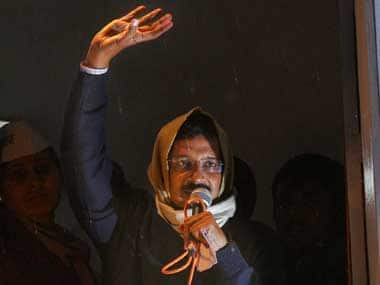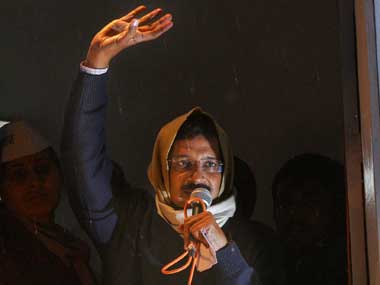It’s over. The first act of the Aam Aadmi Party’s theatrical stint in power in Delhi ended 48 days after it began. It was only fitting that Chief Minister Arvind Kejriwal tendered his resignation over his failure to pass the Jan Lokpal Bill in the Delhi Assembly – he had found the perfect moment to target his twin enemies, the Congress and BJP, for their abject failure to stand up against corruption. Kejriwal’s rise and rise has been all about manufacturing enemies out of the rest of the political class. But to succeed in government – as opposed to scoring in an election – he desperately needs to make some friends. Let there be no doubt; there will be a second act of AAP in office, and probably quite soon, possibly after a snap Assembly poll held simultaneously with the Lok Sabha election in April-May. If opinion polls are to be believed AAP has only become more popular with Delhi’s citizens since the December 2013 election. Even if it were to lose some support from those disgusted with the dharna approach to government, it would not be unreasonable to assume that Kejriwal would get the majority he was denied in the December election. [caption id=“attachment_1391463” align=“alignleft” width=“380”]  Kejriwal announcing his resignation. PTI[/caption] If Kejriwal believes that crossing the halfway mark of 36 seats in Delhi’s assembly of 70 (AAP has 28 seats in the current assembly) will enable him to govern decisively and in the fashion that he alone wants, he is wrong. Several things may have changed by the time Kejriwal becomes Chief Minister again. There will be a new Prime Minister after May. There will be a new Home Minister. It is quite probable that there will be a new Lieutenant Governor of Delhi in case Najeeb Jung gets kicked upstairs to another, larger Raj Bhavan make way for the new establishment’s choice. In short, there will be no Manmohan Singh, Sushil Kumar Shinde and Najeeb Jung to rail against in anger. The reality of Indian politics is also that a new government enjoys a honeymoon period with voters. Whoever the new Prime Minister and Home Minister are will have far greater credibility in public perception than Messrs Singh and Shinde do after a lackluster performance in UPA 2. Kejriwal won’t find bashing them half as easy as with the discredited Congress. Delhi’s peculiar structure of government, which makes it a state unlike any other (power is shared by the Central and state Government) means that Kejriwal and AAP should they form another Government will still have to work with a ruling party which is not theirs. The probability of AAP forming the Union Government in 2014 is close to nil. Again, if opinion polls are to be believed, it could quite possibly be a NDA Government led by the BJP, a sworn enemy of Kejriwal. Kejriwal will have a choice to make. He can continue to be confrontationist with the next (more popular than present) Government and come a cropper. Or he can learn to be friends. If he wants full statehood for Delhi – a perfectly reasonable demand – he needs to negotiate with the next Home Minister, not blackmail him or her with street protests. If he wants to pass the Janlokpal Bill, he needs to persuade the Lieutenant Governor and other parties. Kejriwal needs to remember that he is one player in pluralist democracy, not an autocrat. He will never have the right to force his way on every issue, even if he has a majority in the assembly. Even on corruption, he must accept that while a majority is in favour of eradicating it, there are genuine (and honest) differences of opinion on how to achieve that goal. And he needs to grow up and acknowledge that not everyone who disagrees with him is corrupt. Running a government is more complex than winning an election. To succeed in elections, enemies are fine but the business of governance needs a little bit of help from friends who are not in your own party.
Let there be no doubt; there will be a second act of AAP in office, and probably quite soon, possibly after a snap Assembly poll.
Advertisement
End of Article


)
)
)
)
)
)
)
)
)



